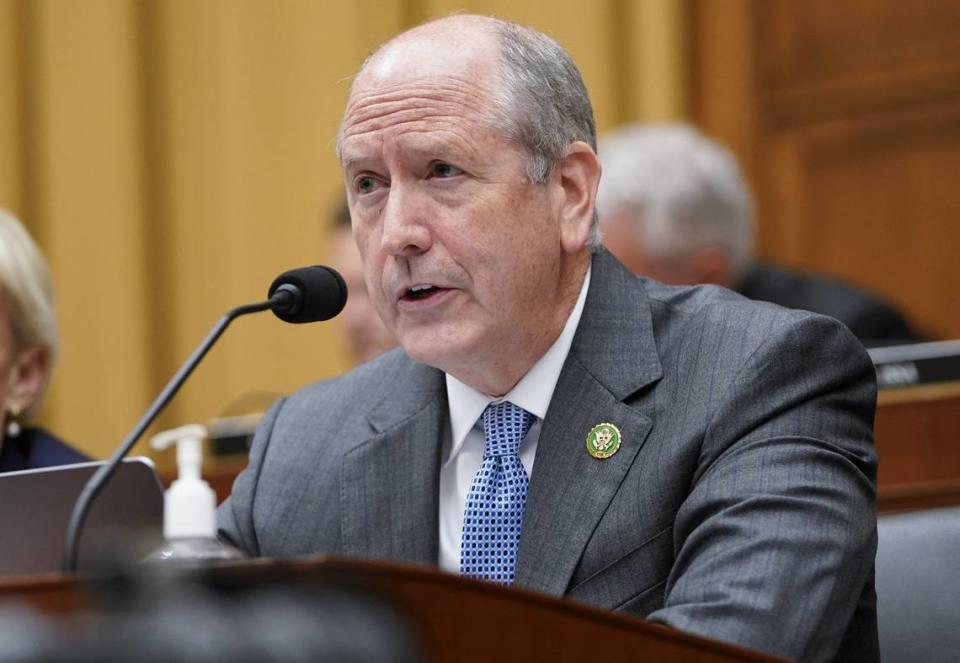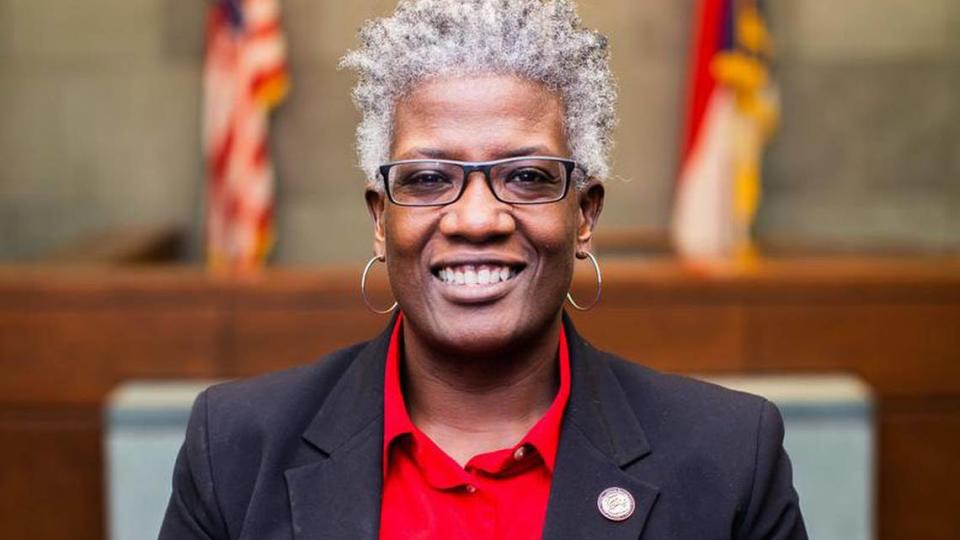NC Dems have attorney general primary. A GOP congressman awaits in fall. What to know
- Oops!Something went wrong.Please try again later.
- Oops!Something went wrong.Please try again later.
- Oops!Something went wrong.Please try again later.
The race for attorney general, expected to be one of the toughest-fought and most expensive campaigns on the ballot this year, will likely see two of North Carolina’s most high-profile and vocal members of Congress face off against each other.
U.S. Rep. Dan Bishop, a member of the House Freedom Caucus, a former state lawmaker and an attorney, is running unopposed in the Republican primary. U.S. Rep. Jeff Jackson, a former prosecutor, state lawmaker and member of the N.C. Army National Guard, is the frontrunner in the Democratic primary. He faces two opponents: Durham County District Attorney Satana Deberry and Fayetteville attorney Tim Dunn.
Ahead of the March 5 primary, here’s what you need to know about the job of attorney general, the candidates who are running and the race so far.
The incumbent, and the office
Attorney General Josh Stein, a Democrat who is currently serving his second term, is running for governor. He’s seeking to follow the path of Democratic Gov. Roy Cooper, who served two terms as attorney general before being elected to the state’s highest office in 2016.
Over two terms as attorney general, Stein has pursued several consumer protection actions that include combating robocalls, investigating Medicaid fraud and securing settlements to hold accountable the e-cigarette company Juul for the vaping epidemic and several drug companies for the opioid epidemic.
He’s also faced criticism from Republicans, who have accused him of ignoring his constitutional duty, when he’s refused to defend laws he disagrees with. The most prominent and recent example was the 12-week abortion ban GOP lawmakers enacted into law last year over the governor’s veto.
The attorney general’s office is one of the most powerful and visible statewide elected offices in North Carolina, second only to the governor. As the state’s top law enforcement official, the attorney general leads the N.C. Department of Justice and represents the state in legal matters.
Since it offers a prominent role in state government, the office of attorney general has often served as a stepping stone to higher office. Four of the past six attorneys general ran for governor; Rufus Edmisten and Lacy Thornburg lost, while Cooper and Mike Easley, his predecessor, both went on to win two terms in the governor’s mansion. Robert Morgan, who served as attorney general from 1969 to 1974, went on to serve one term in the U.S. Senate.
The attorney general’s office offers the opportunity to oversee a major administrative agency and a wide scope to shape and influence policy, providing the experience to build a “portfolio of executive authority and public relations” to enable a run for higher office, said Michael Bitzer, chair of the politics department at Catawba College.
“This platform brings the attorney general a much broader influence that can impact North Carolinians on a day-to-day basis, thus heightening the incumbent’s public image and profile in ways that other offices, like the state auditor, can’t necessarily generate,” Bitzer said in an email.
The candidates
▪ Dan Bishop
On the Republican side, the field quickly cleared after it was reported last May that Bishop was considering a run for attorney general, and that several top GOP figures like Senate leader Phil Berger and Lt. Gov. Mark Robinson would support him if he did.
Bishop officially launched his campaign in early August.
A member of the House Freedom Caucus, Bishop was one of 20 Republicans who contested the election of former Speaker Kevin McCarthy, to negotiate changes to legislative procedure and secure commitments from leadership that conservative priorities would be voted on. He later backed McCarthy after he agreed to hold a vote on the creation of a new subcommittee to investigate the work of the FBI, the departments of Justice and Homeland Security, and other federal agencies.

Before running for Congress in 2019, Bishop served one term in the N.C. House and one in the N.C. Senate. He drew national attention in 2016 for co-sponsoring House Bill 2, the controversial law that required transgender people to use public restrooms in schools and government buildings that matched the gender on their birth certificate.
During a campaign kickoff event in August, Bishop said his top priority as attorney general would be to use the bully pulpit to support law enforcement, WFAE reported, adding that the “the stupidest move in politics in the history of America has been to say we should defund our police.”
In December, Bishop told The N&O he was running because he believed there was “tremendous potential in that office to be deployed to reinvigorate and restore a culture of law and order, and to demonstrate respect for the law.”
Bishop has been endorsed by the Republican Attorneys General Association and the Club for Growth PAC.
▪ Jeff Jackson
On the Democratic side, the leading candidate is Jackson, who entered the race in October after Republican state lawmakers approved a new congressional map that drew him out of his district.
In the 2022 elections, Jackson initially ran for the U.S. Senate seat that was vacated by retiring Sen. Richard Burr, then dropped out before the Democratic primary and endorsed former N.C. Supreme Court Chief Justice Cheri Beasley, who ultimately lost to Republican Sen. Ted Budd.
A congressional map drawn by N.C. Republicans was subsequently thrown out by the N.C. Supreme Court, which had a Democratic majority at the time, and a new map drawn by court-appointed experts was put in place instead. That gave Jackson the opportunity to run for Congress.

Once in Washington, Jackson quickly emerged as one of the most visible members of the House’s freshman class, gaining national attention for amassing a substantial following on social media, particularly on TikTok, and using it to directly communicate with constituents and explain the inner-workings of Congress to them.
Before running for Congress, Jackson served eight years in the N.C. Senate. He previously worked at a Charlotte law firm, and as an assistant district attorney in Gaston County. An Army veteran, Jackson was deployed to Afghanistan for a year, and continues to serve in the Army National Guard.
When he launched his campaign in October, Jackson told McClatchy that he saw the job as a chance to fight for families and take on political corruption, saying that he was “the last person corrupt politicians want to see as Attorney General because I don’t care about what party they’re in.”
Jackson’s campaign quickly secured endorsements from several N.C. elected officials, including all of the other Democratic members of the state’s congressional delegation, more than half of the sitting Democrats in the state Senate, and many House Democrats, including House Minority Leader Robert Reives.
▪ Satana Deberry
The twice-elected district attorney of Durham County announced she was running in the Democratic primary in November.
Deberry, who would be the first Black woman elected to one of the 10 statewide offices that comprise the Council of State, argues she is the most qualified candidate in the race, pointing to her experience as the top prosecutor in Durham and past work as a criminal defense attorney, general counsel for the N.C. Department of Health and Human Services and executive director of the N.C. Housing Coalition.

While announcing her run, Deberry sought to distinguish herself from Jackson by telling WFAE she was “a serious lawyer and a serious person — not a national social media following.”
Deberry has said her top priorities as attorney general would be protecting reproductive rights and voting rights and protecting consumers from scams and wage theft.
Among others, Deberry has been endorsed by state Sen. Graig Meyer, state Rep. Kelly Alexander, former Carrboro Mayor Damon Seils, the N.C. Democratic Party’s Progressive Caucus and the Durham Committee on the Affairs of Black People, an influential, nearly century-old political group.
▪ Tim Dunn
An attorney from Fayetteville with more than 33 years of service in the Marines, Dunn launched his campaign in April.
Through his law practice, Dunn has worked on civil, criminal and military cases. He primarily represents juveniles, veterans and the military community.
Dunn previously ran for Congress in 1996 and 2006.
Fundraising and money
Jackson is currently leading when it comes to fundraising, having raised a total of $2 million since entering the race in October. As of Dec. 31 of last year, Jackson reported having $1.8 million on hand.
Bishop has raised more than $1.3 million since launching his campaign in August. More than $900,000 of that came within the first 10 days of his campaign. Heading into 2024, Bishop reported having $1.2 million in the bank.
Deberry reported raising just over $44,000, and finishing last year with a little more than $30,000 on hand.
Dunn’s campaign filed a fundraising report with the State Board of Elections, but told The N&O the report contained inaccurate information, and that they planned to amend it.
Candidate questionnaires
The News & Observer and The Charlotte Observer asked candidates running in contested races in the primary election to fill out a candidate questionnaire. That includes the Democratic primary for attorney general. Find responses from the candidates who filled them out by visiting newsobserver.com/voter-guide.
Jeff Jackson
Tim Dunn
Questionnaires will be sent after the primary to the two attorney general candidates who advance to the general election.
How to vote in the primary
Registered Democrats and Republicans will vote their party’s ballot in the March 5 election. Unaffiliated voters can choose which party’s ballot to vote.
There are no third-party candidates running for attorney general this year.

